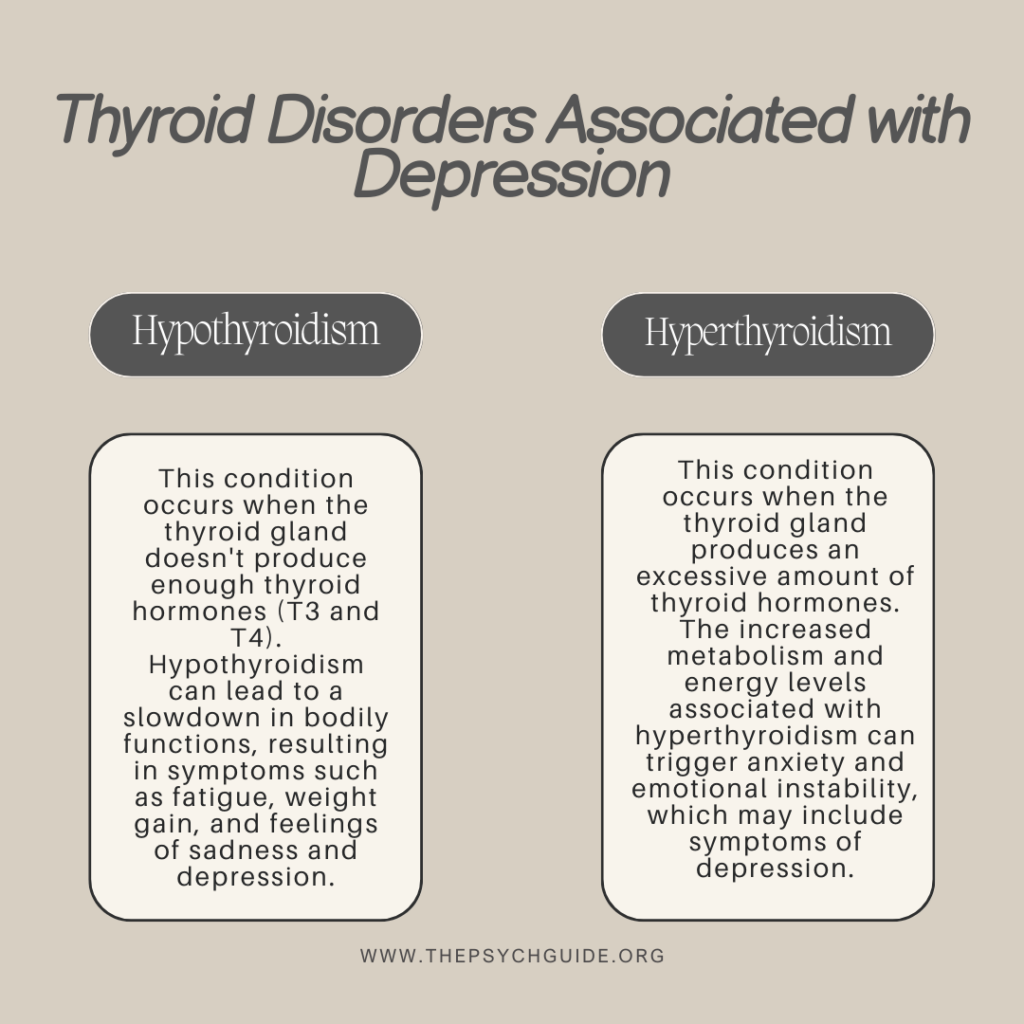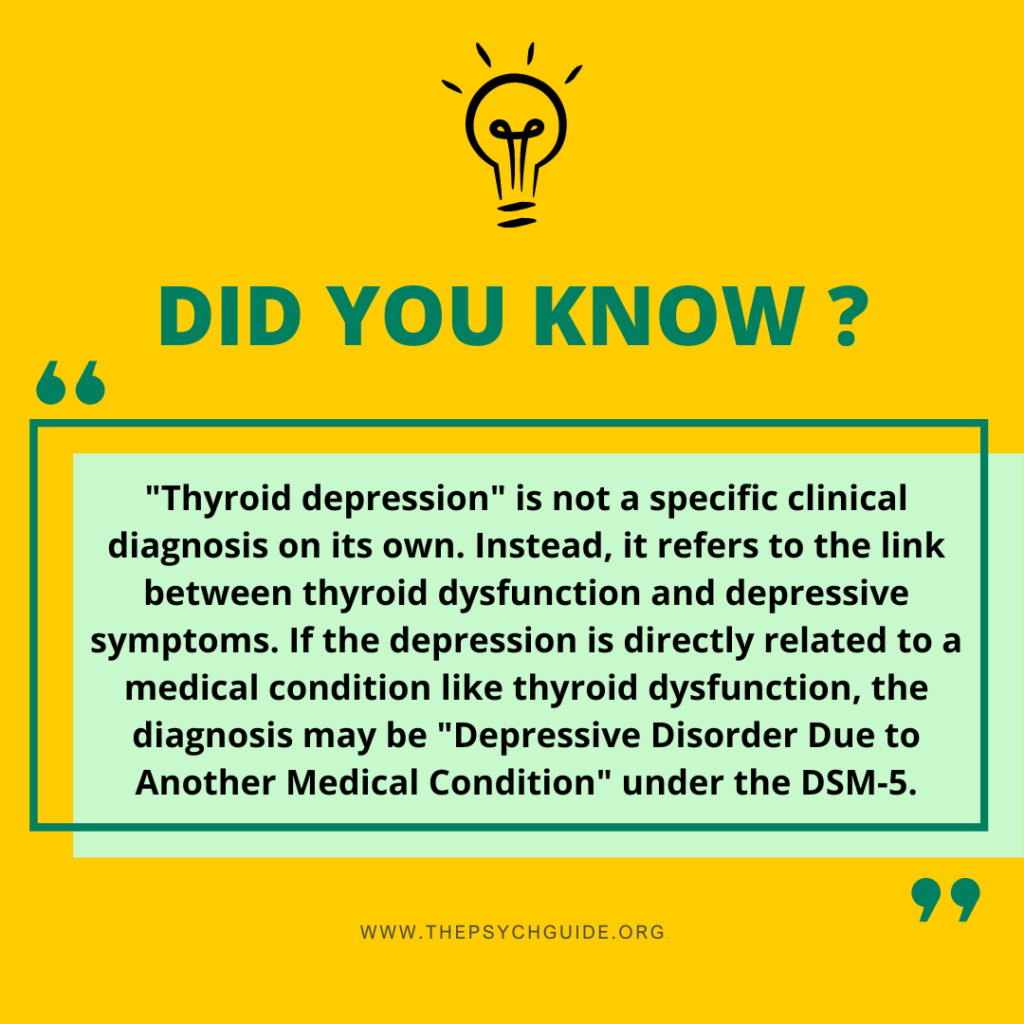Recent scientific findings have begun solving a hidden connection between depression and an often-overlooked gland in our bodies – the thyroid. This small, butterfly-shaped gland nestled in the throat holds the power to affect our mood, energy levels, and overall well-being in ways that may surprise you.
Symptoms of thyroid depression refer to a range of emotional and physical signs that can arise due to an underactive or overactive thyroid gland. Previous research supports the link between hypothyroidism and depression. Depression is a frequent disorder in hypothyroid patients, with the vast majority having treatment-resistant depression. This is due to several factors, including how thyroid hormones affect the HPT axis.
On the other side, it has been uncovered that depressive patients have underlying hypothyroidism. So, it’s important to check for hypothyroidism in depressed patients.
Symptoms of Thyroid depression include persistent sadness, chronic fatigue and low energy levels, unexplained weight changes, disturbed sleep patterns, cognitive difficulties, decreased interest and pleasure in activities, heightened anxiety and irritability, physical symptoms such as aches and pains, changes in appetite, and, in severe cases, even suicidal thoughts.
It’s important to remember that these symptoms can occur simultaneously with other conditions, highlighting the necessity of consulting with a healthcare professional to accurately diagnose and address the underlying causes.
Table of Contents
ToggleKey takeaways!
- Thyroid depression refers to the depressive symptoms that can arise due to an underactive thyroid (hypothyroidism) or an overactive thyroid (hyperthyroidism).
- Common symptoms of thyroid depression include persistent sadness, feelings of hopelessness, lack of energy, fatigue, and difficulty concentrating. These symptoms may overlap with those of clinical depression, making it essential to consider thyroid dysfunction as a potential underlying cause.
- Changes in appetite and weight can occur in individuals with thyroid depression. Hypothyroidism often leads to weight gain, while hyperthyroidism can cause weight loss. These fluctuations are typically unrelated to changes in diet or physical activity.
- Sleep disturbances are prevalent in thyroid depression. Hypothyroidism can lead to excessive sleepiness and a desire for more sleep, while hyperthyroidism may cause insomnia or difficulty falling asleep.
- Thyroid depression can impact cognitive function and memory. Individuals may experience brain fog, forgetfulness, and difficulty concentrating on tasks.
- Physical symptoms such as muscle weakness, joint pain, and sensitivity to cold are commonly observed in thyroid depression. Hypothyroidism can lead to generalized aches and pains, while hyperthyroidism can cause muscle weakness and tremors.
- Changes in menstrual patterns and libido can occur in individuals with thyroid depression. Women may experience irregular or heavier menstrual periods, while men may notice a decrease in sexual desire.
- It is crucial to consult a healthcare professional for an accurate diagnosis of thyroid depression. Blood tests to measure thyroid hormone levels, such as thyroid-stimulating hormone (TSH) and free thyroxine (T4), are typically performed.
- Thyroid depression can be effectively managed through medication, such as thyroid hormone replacement therapy for hypothyroidism or anti-thyroid medications for hyperthyroidism. Lifestyle modifications, including a healthy diet, regular exercise, stress management, and adequate sleep, can also support overall well-being.
Can the Thyroid affect my Mood?
According to the Mayo Clinic, a thyroid condition can impact mood. Anxiety or despair are frequent thyroid disease symptoms that have an impact on mood.

Hyperthyroidism, or an overactive thyroid, can cause mood symptoms like Anxiety, Nervousness, and Irritability.
Mood symptoms associated with hypothyroidism, an underactive thyroid disorder, include Depression and unusual exhaustion.
Although mood can be impacted by thyroid disease, it’s uncommon for those symptoms to be the only indication of the condition. Several more symptoms, including the following, are linked to thyroid disease: Gain or loss of weight, increased sensitivity to cold or heat, Changes in bowel movements, and modifications to menstrual periods.
Detailed Symptoms of Thyroid Depression.
1. Persistent Sadness:
Persistent sadness is a core symptom of depression. It can manifest as a deep feeling of unhappiness or an emotional heaviness that continues over an extended period. People with thyroid-related depression may find it challenging to experience moments of joy or find pleasure in activities they once enjoyed. This prolonged sadness can affect overall mood and outlook, leading to feelings of hopelessness and despair.
2. Loss of Interest or Pleasure:
Loss of interest or pleasure, known as anhedonia, can occur in depression. In the context of thyroid dysfunction, individuals may lose interest in activities, hobbies, or social engagements that used to bring them joy. They may feel a lack of motivation and struggle to derive pleasure or satisfaction from previously enjoyable experiences. This loss of interest can further contribute to feelings of emptiness and detachment.
3. Fatigue and Low Energy:
Fatigue and low energy levels are common symptoms in both depression and thyroid disorders. With thyroid dysfunction, individuals may experience persistent and overwhelming fatigue that goes beyond normal tiredness. This fatigue can be debilitating, making it challenging to engage in daily activities, work, or social interactions. The lack of energy can amplify feelings of helplessness and contribute to a sense of being unable to cope with daily responsibilities.
4. Changes in Appetite:
Thyroid dysfunction can disrupt the regulation of appetite, leading to changes in eating patterns. In some cases, individuals may experience an increase in appetite, resulting in weight gain. This increase in appetite is often accompanied by cravings for specific foods, especially ones high in carbohydrates. On the other hand, some individuals may have a decreased appetite, leading to weight loss. These changes in appetite and subsequent weight changes can impact body image, and self-esteem, and contribute to feelings of dissatisfaction and sadness.
5. Sleep Disturbances:
Sleep disturbances are common in both depression and thyroid disorders. People with thyroid-related depression may experience difficulty falling asleep, staying asleep, or having restless and unrefreshing sleep. Alternatively, they may experience excessive sleepiness during the day, even after getting a full night’s sleep. These sleep disturbances can disrupt the body’s natural circadian rhythm, exacerbate feelings of fatigue, and contribute to a sense of frustration and mood instability.
6. Irritability and Agitation:
Irritability and agitation can accompany depression, and individuals with thyroid-related depression may experience these symptoms more prominently. They may become easily irritated or frustrated by minor inconveniences, have a reduced tolerance for stress, and find it challenging to control their emotional responses. This heightened irritability and agitation can strain relationships, create conflict, and contribute to feelings of guilt or self-blame.
7. Difficulty Concentrating:
Difficulty concentrating, also known as cognitive impairment, is a common symptom of depression. In the context of thyroid dysfunction, it can be further exacerbated. Individuals may experience foggy thinking, memory lapses, and difficulties with decision-making. They may find it challenging to stay focused, absorb new information, or complete tasks efficiently. These cognitive impairments can lead to decreased productivity, frustration, and self-doubt.
8. Feelings of Worthlessness or Guilt:
Feelings of worthlessness and excessive guilt are common in depression. In thyroid-related depression, these feelings may be amplified. Individuals may perceive themselves as failures, excessively blame themselves for perceived shortcomings, or believe that they are a burden to others. These negative self-perceptions can contribute to a deep sense of shame, and low self-esteem, and reinforce depressive thoughts and feelings.
9. Social Withdrawal:
Individuals with thyroid-related depression may withdraw from social interactions and isolate themselves from friends, family, or social activities. They may feel a lack of energy or motivation to engage socially, experience a loss of interest in socializing, or fear being judged or misunderstood. Social withdrawal can lead to feelings of loneliness, exacerbate depressive symptoms, and hinder the formation of supportive relationships.
10. Physical Symptoms:
Thyroid dysfunction can manifest in various physical symptoms that can contribute to depressive feelings. These can include headaches, body aches, joint pain, muscle stiffness, dry skin, and hair loss. These physical discomforts can impact overall well-being, lead to increased distress, and contribute to a sense of physical and emotional fatigue.
11. Low Libido:
Libido refers to a person’s sexual drive or desire for sexual activity. It is a term often used in psychology and sexual health to describe one’s overall sexual appetite or interest.
Hormonal imbalances caused by thyroid dysfunction can lead to a decrease in libido and sexual interest. Individuals may experience a reduced desire for sexual activity, a diminished capacity for arousal, or difficulties with sexual performance. These changes in sexual function can contribute to feelings of frustration, affect self-esteem, and strain personal relationships.
12. Sensitivity to Cold or Heat:
According to Medical News Today :
“Hypothyroidism can slow down metabolism, which can lead to a drop in core body temperature. As such, some people with low levels of thyroid hormones may feel cold all the time or have a low tolerance of the cold”.
Hypothyroidism (underactive thyroid) can lead to an intolerance to cold temperatures. Individuals may feel cold even in relatively warm environments, have cold extremities, or experience chills.
Contrariwise, hyperthyroidism (overactive thyroid) can cause sensitivity to heat, leading to excessive sweating and discomfort even in moderate temperatures. These physical sensations can be distressing, impact daily comfort, and contribute to feelings of irritability and mood instability.
13. Slowed Speech and Movements:
According to research :
“Hypothyroidism can cause notable voice changes, such as low voice, roughness, reduced range, and vocal fatigue”.
So hypothyroidism can lead to a slowing down of speech, movements, and overall physical activity. Individuals may experience difficulties finding the right words, have a slower speech rate, or feel physically slow. These slowed movements and speech patterns can contribute to a sense of frustration, impact productivity, and further cause feelings of depression.

Causes of Thyroid Depression.
Thyroid-related depression happens when a person has an underactive thyroid gland (hypothyroidism) and experiences feelings of sadness and low mood.
Causes of thyroid-related depression may include:
- Imbalance of thyroid hormones: When the thyroid doesn’t produce enough hormones, it can affect the brain and lead to depressive symptoms.
- Changes in brain chemicals: Thyroid hormones help regulate chemicals in the brain that affect mood. Imbalances in these chemicals can contribute to depression.
- Inflammation and immune system issues: Hypothyroidism is linked to chronic low-grade inflammation and immune system changes, which can play a role in depression.
- Fatigue and physical symptoms: Hypothyroidism often causes tiredness, weakness, and other physical symptoms that can affect daily life and contribute to feelings of sadness.
- Psychological and emotional impact: Dealing with a chronic condition like hypothyroidism can be emotionally challenging, causing stress and potentially leading to depression.
Treatment of Thyroid Depression.
Here are some common treatment approaches:
Thyroid hormone replacement therapy:
If hypothyroidism is diagnosed, healthcare providers prescribe synthetic thyroid hormones (such as levothyroxine) to restore normal hormone levels and alleviate depressive symptoms associated with thyroid dysfunction.
Antidepressant medications:
In some cases, healthcare providers may prescribe antidepressant medications to help manage the depressive symptoms. These medications can help regulate brain chemicals and improve mood.
Psychotherapy:
Talk therapy, such as cognitive-behavioral therapy (CBT), can be beneficial in addressing negative thought patterns, managing stress, and developing coping strategies for depression. It provides support and guidance in navigating the emotional impact of thyroid dysfunction.
Lifestyle modifications:
Adopting a healthy lifestyle can support overall well-being and may help alleviate depressive symptoms. This includes regular exercise, balanced nutrition, adequate sleep, and stress management techniques.
Support networks:
Connecting with support groups or seeking support from family and friends can provide emotional support, understanding, and a sense of community. Sharing experiences and coping strategies with others who have similar conditions can be helpful.
FAQs
What are the common symptoms of depression associated with thyroid dysfunction?
Common symptoms of depression associated with thyroid dysfunction may include persistent sadness, low mood, feelings of worthlessness or guilt, decreased interest in activities, changes in appetite and weight, sleep disturbances, fatigue, difficulty concentrating, and thoughts of self-harm or suicide.
Can an underactive thyroid (hypothyroidism) cause depression?
Yes, an underactive thyroid can kick into depressive symptoms. Hypothyroidism is characterized by insufficient thyroid hormone production, leading to a slowdown in bodily processes. This can affect neurotransmitter activity, leading to depressive symptoms.
How can I differentiate between depression caused by thyroid dysfunction and primary depression?
It can be challenging to differentiate between thyroid-related depression and primary depression without a comprehensive medical evaluation. A healthcare professional will assess your symptoms, and medical history, and conduct appropriate laboratory tests to identify the underlying cause.
What is the relationship between the thyroid and depression?
The thyroid gland produces hormones that regulate various bodily functions, including metabolism and mood regulation. Imbalances in thyroid hormone levels can disrupt neurotransmitter activity and contribute to symptoms of depression.
How can I manage thyroid-related depression symptoms?
Treatment for thyroid-related depression involves addressing the underlying thyroid dysfunction. This may include hormone replacement therapy for hypothyroidism or antithyroid medications, radioactive iodine therapy, or surgery for hyperthyroidism. Additionally, psychotherapy and/or antidepressant medication may be recommended to manage depressive symptoms.
Are there any lifestyle changes that can help to get rid of thyroid-related depression symptoms?
While lifestyle changes alone may not resolve thyroid dysfunction, they can complement medical treatment and promote overall well-being. Engaging in regular exercise, maintaining a balanced diet, managing stress, practicing good sleep hygiene, and seeking social support can contribute to improving mood and overall mental health.
What are the treatment options for thyroid-related depression?
Treatment options for thyroid-related depression depend on the specific thyroid condition. For hypothyroidism, hormone replacement therapy with synthetic thyroid hormones is commonly prescribed. In hyperthyroidism, treatment may involve antithyroid medications, radioactive iodine therapy, or surgery.
Additionally, psychotherapy and antidepressant medication may be recommended to manage depressive symptoms.
Can thyroid medication alone alleviate depressive symptoms?
In some cases, addressing the underlying thyroid dysfunction with appropriate medication can lead to an improvement in depressive symptoms. However, for individuals with persistent or severe depression, a comprehensive treatment approach involving both thyroid medication and additional interventions such as psychotherapy or antidepressants may be necessary.
How long does it take for thyroid treatment to alleviate depressive symptoms?
The timeframe for symptom improvement can vary depending on factors such as the individual’s specific condition, the effectiveness of the prescribed treatment, and their overall health. It’s important to follow the treatment plan recommended by your healthcare professional and communicate any concerns or lack of improvement.
Conclusion.
It is important to remember that each individual’s experience with thyroid-related depression may vary, and treatment approaches should be tailored to their specific needs. Consulting with a qualified healthcare professional or endocrinologist is essential for accurate diagnosis, personalized advice, and reasonable treatment options.
By raising awareness about thyroid depression symptoms, we can promote a greater understanding of the impact of thyroid dysfunction on mental health and ensure that individuals receive the necessary support and treatment to alleviate their symptoms and improve their overall well-being.

